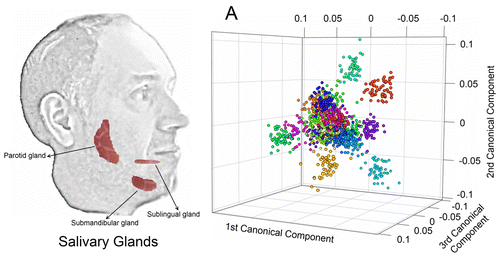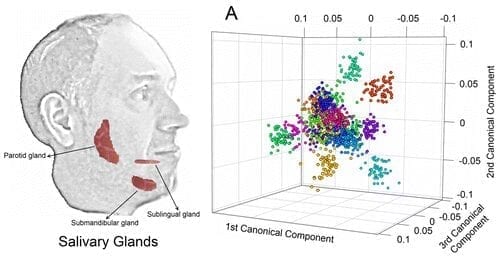
Testing for health conditions usually involves needles, X-rays and other invasive or uncomfortable measures. To make diagnostics less burdensome for patients, scientists are developing alternatives, looking for disease markers in urine — and even spit.
Now a study, appearing in ACS’ Journal of Proteome Research, demonstrates for the first time that individuals may have saliva “fingerprints.” The finding suggests that identifying changes in these baseline fingerprints could someday be a reliable way to detect disease.
In the search for non-invasive and less stress-inducing ways to detect disease, much effort has focused on urine testing. Individuals’ urine samples have specific metabolic signatures that can become altered when a person develops a health problem. But compounds in urine can also vary depending on factors such as diet and environment. Saliva has similar potential as an easy-to-access fluid that changes in response to health conditions, but could be less affected by diet and the environment. Paola Turano, Kurt Zatloukal and colleagues wanted to investigate how reliable this route might be.
The researchers sampled saliva and urine from 23 healthy volunteers multiple times a day over 10 days. The molecular signatures of saliva and urine were distinct and consistent for each participant. But profiles from spit samples changed less due to dietary variations than those from urine. Although longer-term research would be needed, this initial work on saliva fingerprints suggests that they could be useful in searching for signs of disease, say the researchers.
The Latest on: Diagnosing disease
[google_news title=”” keyword=”Diagnosing disease” num_posts=”10″ blurb_length=”0″ show_thumb=”left”]
via Google News
The Latest on: Diagnosing disease
- Ensemble deep learning models enhance early diagnosis of Alzheimer's disease using neuroimaging dataon May 9, 2024 at 7:24 am
EDL combines the outputs of several machine learning (ML) models to enhance their generalization performance. The traditional approach to building an ensemble uses deep neural networks (DNNs) in a ...
- Looking back on the 8 years that followed my IPF diagnosison May 9, 2024 at 7:00 am
The anniversary of an IPF diagnosis is always a time for reflection. Columnist Charlene Marshall shares her thoughts on her own anniversary.
- For adults, autism diagnosis can unlock a new lifeon May 9, 2024 at 5:44 am
An adult autism diagnosis is an identity builder, minting new members of a growing community and creating a sense of belonging for those grappling with loneliness.
- Congresswoman and Mom of 2 Speaks Candidly About Her Incurable Brain Disease: 'I'm Too Young for This' (Exclusive)on May 9, 2024 at 4:50 am
Virginia Rep. Jennifer Wexton, a three-term Congresswoman, speaks with PEOPLE about her diagnosis of progressive supranuclear palsy — or 'Parkinson's on steroids' — a rare and degenerative brain disor ...
- Bruce Willis' wife says family 'desperately needed' support after dementia diagnosison May 8, 2024 at 9:24 am
Emma Heming Willis opens up about how her husband Bruce Willis’ dementia diagnosis impacted her and their family.
- At 54, Terry Kitay was diagnosed with early-onset Alzheimer's disease. This is her daughter's storyon May 7, 2024 at 2:28 pm
Ultimately, at the age of 54, Terry was diagnosed with early-onset Alzheimer's disease — the most common type of dementia. It is progressive and there is no cure. Terry's diagnosis came as a huge ...
- Multifrequency tympanometry could aid diagnosis of Meniere diseaseon May 6, 2024 at 10:50 am
Multifrequency tympanometry (MFT) could aid the diagnosis of Meniere disease (MD), according to a review published online March 4 in the Journal of Clinical Medicine.
- Novel score validated for diagnosis of gastroesophageal reflux diseaseon May 6, 2024 at 10:40 am
A novel high-resolution manometry (HRM) score can stratify the risk and severity of gastroesophageal reflux disease (GERD), according to a study published online March 27 in the UEG Journal.
- AI may help diagnose rare diseases years earlieron May 3, 2024 at 10:47 am
Artificial intelligence might be able to identify patients who have rare diseases years earlier than they would typically be diagnosed, a new study says.
- AI-MARRVEL: A leap forward in diagnosing genetic diseases with over 98% precisionon April 30, 2024 at 4:12 am
AIM is a machine-learning classifier that combines over 3.5 million variations from thousands of identified cases and expert-engineered variables to enhance molecular diagnosis. The team compared AIM ...
via Bing News











